Docx files for personal book: Verbum 9 part 1; Verbum 9 part 2; Verbum 9 part 3; Verbum 9 part 4; Verbum 9 part 5; Verbum 9 part 6; How to use the Verbum Lectionary and Missal; Verbum 8 tips 1-30; Verbum 8 tips 31-49
Reading lists: Catholic Bible Interpretation
Please be generous with your additional details, corrections, suggestions, and other feedback. This is being built in a .docx file for a PBB which will be shared periodically.
Note: Verbum 9 part 6 is now available in dropbox. Each part contains approximately 30 posts.
Previous post: Verbum Tip 8q Next post: Verbum Tip 8s
How does one search the data in Names of God?
Unlike most of the interactives, Verbum does not expose this data through a Label. However, one can do a search for words/phrases that are tagged as <Person God> and screen out the implied references that are not names i.e. verbs and pronouns. Dave Hooton provided this search argument: <Person God> NOT INTERSECTS <LogosMorphHeb ~ V????????>, <LogosMorphHeb ~ R??????>[1] Note the morphology is for Hebrew only – it will not work correctly on the Greek. One can then use the analysis view to export the data for sorting and further screening.
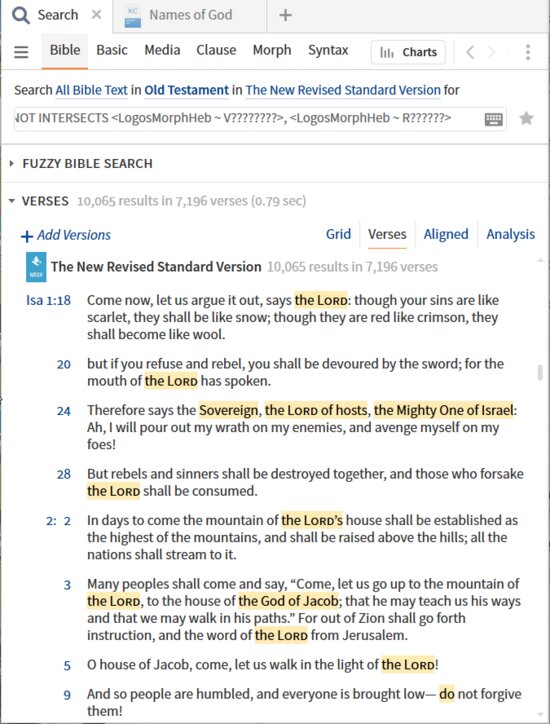
Keep Smiling 4 Jesus offers a different solution which will assign different colors based on the root of the divine name: (<Root = lbs/he/יהוה> OR <Root = lbs/he/אֱלֹהִים> OR <Root = lbs/he/אָדוֹן> OR <LogosMorphHeb ~ N?????>) INTERSECTS <Person God>
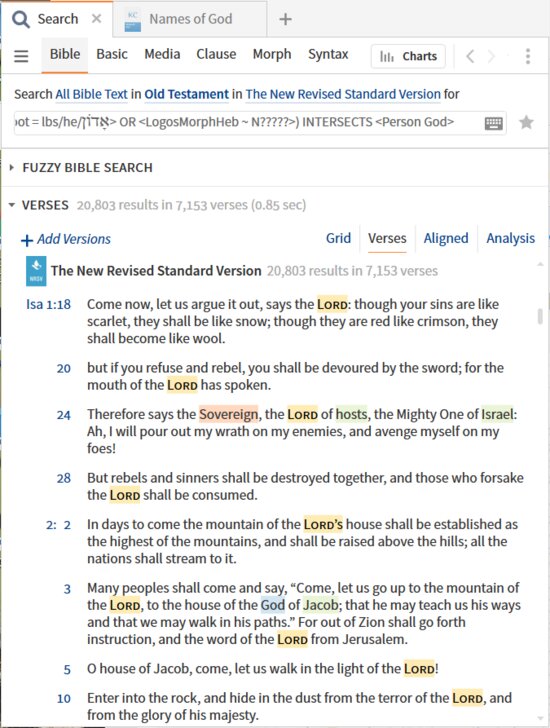
Note that the two searches do not produce the same results, not even the same number of verses. To understand why, save the results of each search as a passage list.
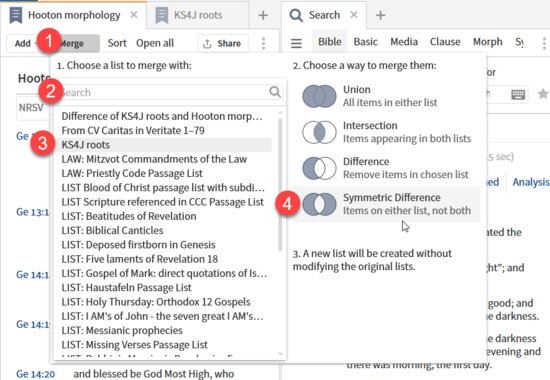
- Select the merge option on the Hooton morphology passage list (1)
- Enter KS4J in the search box (2) or select KS4J roots if it is visible (3)
- Select symmetric difference (4) to select items that are in only one of the passage lists.
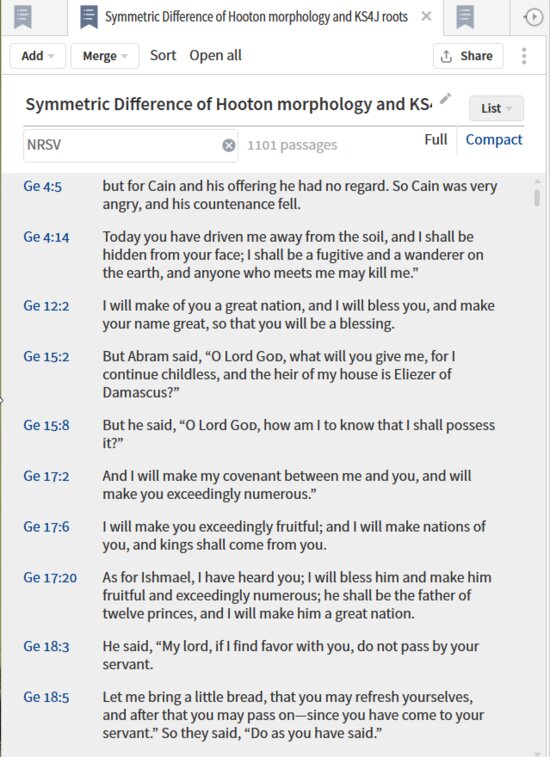
Gen 4:5 occurs on the morphology list but not the root list. Why? It appears that the intervening “not” causes the screening out of verbs to fail. This means that if we use this search, we must screen out false positives due to negation … or refine the search.
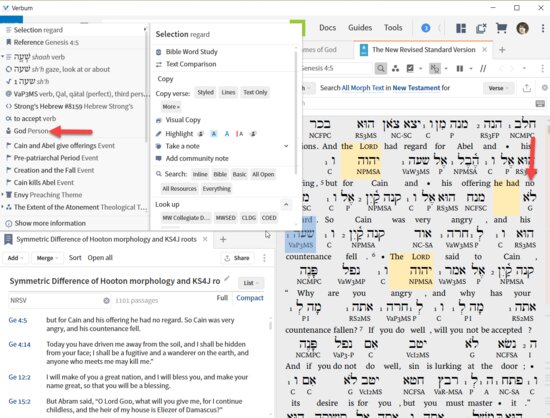
Note that both searches are dependent upon the Faithlife coding choices; look at the coding for God/three men/angels in the Abraham at Mamre passage of Genesis 18 especially 18.5 which is selected only by the root search.
At this point one can
- scan the results of the searches by hand, perhaps refining the searches
- simply adopt the list given in the Names of God interactive
- rely on the Hebrew and Aramaic sections of the Referred to As section of the Factbook entry on God
- take Rosie’s approach of using resources as the starting point. Her list of resources, all available in Vebum:
- Burney, C. F. Outlines of Old Testament Theology. Edited by Leighton Pullan. Oxford Church Text Books. London: Rivingtons, 1899.
- Connelly, Douglas. Names of God: Glimpses of His Character: 8 Studies for Individuals or Groups: With Notes for Leaders. A LifeGuide Bible Study. Downers Grove, IL: IVP Connect: An Imprint of InterVarsity Press, 2012.
- De León, Luis. Luis de León: The Names of Christ. Edited by Richard J. Payne. Translated by Manuel Durán and William Kluback. The Classics of Western Spirituality. New York; Ramsey, NJ; Toronto: Paulist Press, 1984.
- Evans, Tony. Praying through the Names of God. Eugene, OR: Harvest House Publishers, 2014.
- Hemphill, Ken. God Is. Nashville, TN: B&H Books, 2008.
- Horton, T.C., and Charles Hubert. Names of Christ. Chicago: Moody Press, 1994.
- Hurlburt, Charles, and T C Horton. The Wonderful Names of Our Wonderful Lord. Uhrichsville, OH: Barbour Books, 2012.
- Koessler, John. Names of the Believers. Chicago, IL: Moody Publishers, 1997.
- Loeks, Mary Foxwell. Names of God: Meditations. Nashville: Thomas Nelson, 2008.
- Mallin, Barri Cae, and Shmuel Wolkenfeld. Intimate Moments with the Hebrew Names of God. Orlando, FL: Bridge-Logos Publishers, 1999.
- McLaughlan, David. Beloved Names of God: Life-Changing Thoughts on 99 Classic Names. Uhrichsville, OH: Barbour Books, 2011.
- McQuade, Pamela L., Drew Josephs, Ellen Caughey, and Jewell Johnson. The Top 100 Devotional Collection: Featuring the Top 100 Women of the Bible, the Top 100 Men of the Bible, the Top 100 Miracles of the Bible, the Top 100 Names of God, and the Top 100 Women of the Christian Faith. Uhrichsville, OH: Barbour Books, 2014.
- Names of God. Bellingham, WA: Faithlife, 2015.
- Pennington, Ava. Daily Reflections on the Names of God: A Devotional. Grand Rapids, MI: Revell, 2013.
- Pennington, Ava. One Year Alone with God: 366 Devotions on the Names of God. Grand Rapids, MI: Revell, 2010.
- Pritchard, Ray. Names of the Holy Spirit. Chicago: Moody Press, 1995.
- Publishing, Rose. Names of God. Torrance, CA: Rose Publishing, 2011.
- Publishing, Rose. Names of Jesus. Torrance, CA: Rose Publishing, 2011.
- Publishing, Rose. Names of the Holy Spirit. Torrance, CA: Rose Publishing, 2011.
- Richards, Larry. Every Name of God in the Bible. Everything in the Bible Series. Nashville, TN: Thomas Nelson, 2001.
- Skinner, John. The Divine Names in Genesis. London; New York; Toronto: Hodder and Stoughton, 1914.
- Spangler, Ann. Names of God Bible, the. Grand Rapids, MI: Baker, 2011.
- Spangler, Ann. Praying the Names of Jesus: *. Grand Rapids, MI: Zondervan, 2009.
- Spangler, Ann. The Names of God. Grand Rapids, MI: Zondervan, 2011.
- Sproul, R. C. The Unexpected Jesus: The Truth Behind His Biblical Names. Fearn, UK: Christian Focus Publications, 2005.
- Spurrell, G. J. Notes on the Hebrew Text of the Book of Genesis. Oxford: Clarendon Press, 1887.
- Stone, Nathan. Names of God. Chicago: Moody Press, 1944.
- Towns, Elmer L. The Ultimate Guide to the Names of God: Three Bestsellers in One Volume. Grand Rapids, MI: Bethany House, 2014.
- Vander Meulen, Elizabeth L., and Barbara D. Malda. His Names Are Wonderful: Getting to Know God through His Hebrew Names. Baltimore, MD: Messianic Jewish Publishers, 2005.
In short, some seemingly “simple” searches turn out to be quite complex even before you add questions of title vs. name, handling of variants, etc. As one building a search you must know how important it is that your list be accurate and complete. Be prepared to come at the data from two different ways to verify your results.
Two principles are critical:
- The results are only as accurate as the tagging they are dependent on
- Verbum uses Guides, Factbook, and interactives to supply “canned” searches, some of which users cannot replicate in the Search tools. Take advantages of them.
Build a search for all names of people in a Bible book, excluding divine names.
One approach is to simply select the appropriate names from the People facet of the Bible Browser and the appropriate Bible book facet. Remember that the facet includes group, generic, and divine persons to screen out.
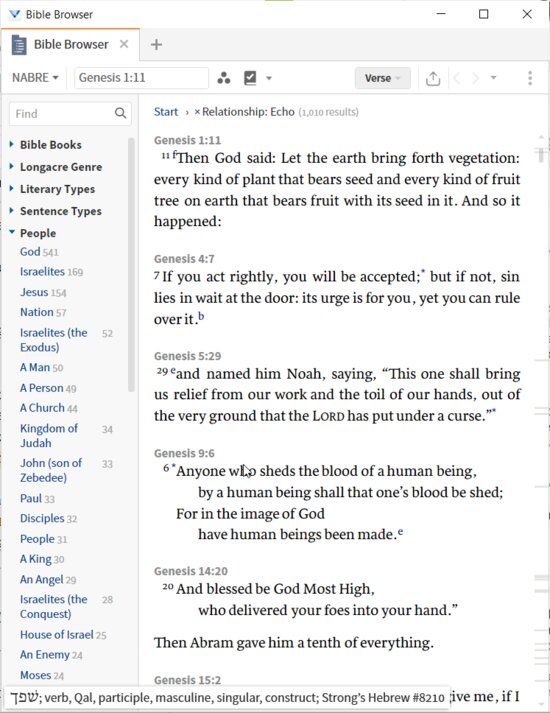
A second approach requires that you consider the Hebrew texts separately from the Greek texts. For Hebrew texts, the Logos Hebrew Morphology includes the identification of proper nouns.
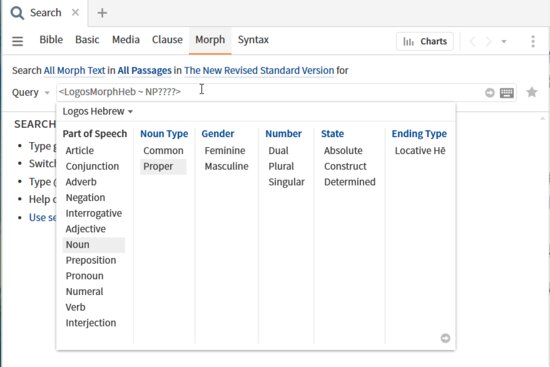
To omit divine names ANDNOT <Person God> should work. However, there is no way to eliminate the proper place names. This requires the expansion of the ANY value to datatypes such as <Person > and <Place>.
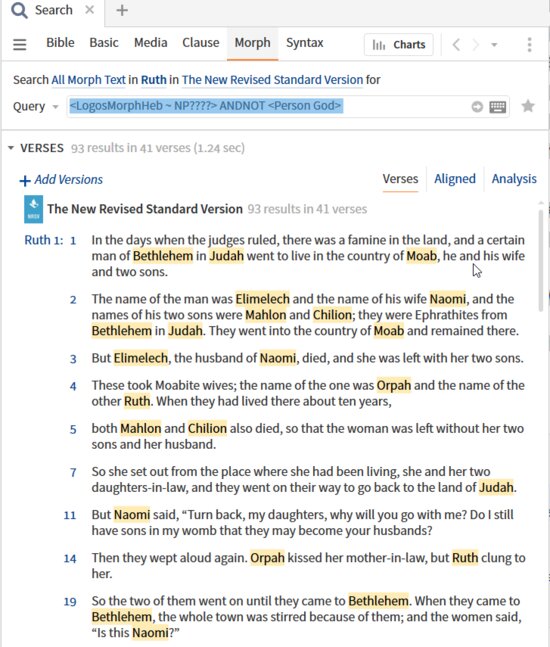
The Logos Greek morphology, however, does not include proper nouns as a separate category. Instead one needs to depend on Louw, Johannes P., and Eugene Albert Nida. Greek-English Lexicon of the New Testament: Based on Semantic Domains. New York: United Bible Societies, 1996.
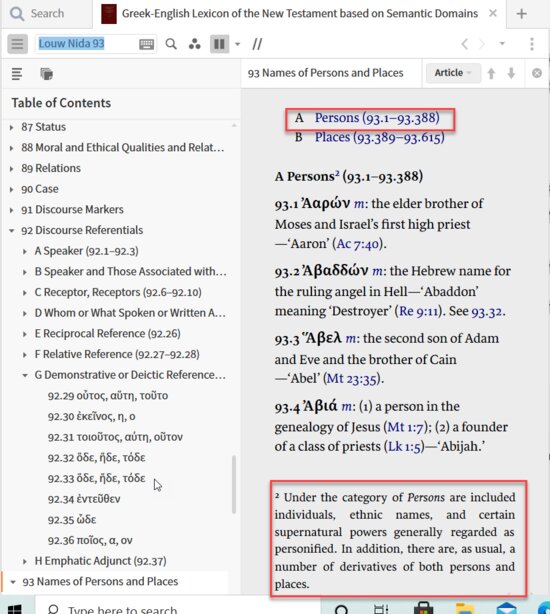
This generates a search term of <LN 93.1-93.388>. However, the search results show a problem, highlighted in red.
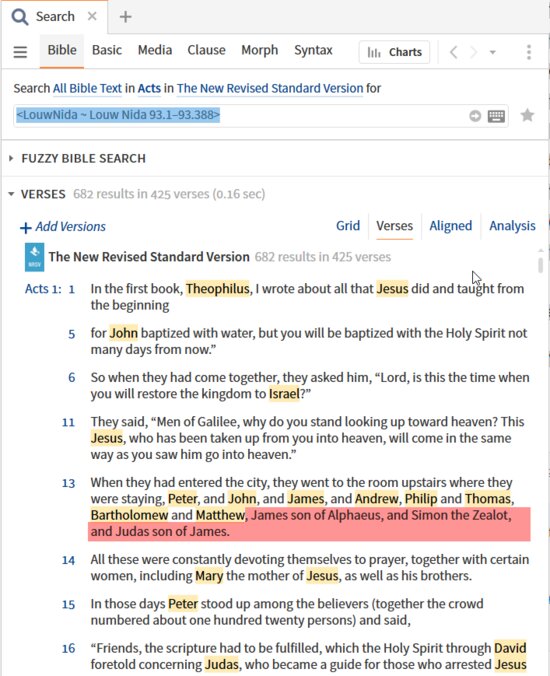
This is a timing problem that returned erroneous highlighting: BUG:Incomplete search results shown - Faithlife Forums (logos.com)
What systematic theology resources address the topic of actual sin?
This is a simple application of the Lexham Systematic Theology Ontology datatype with the section extension. This is appropriately a Basic search against a temporary collection of type:systematic theology.
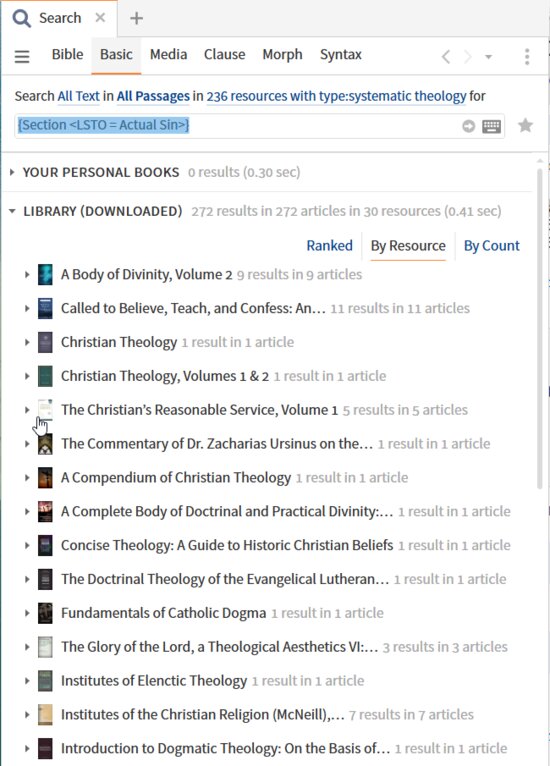
How many verses have all three of these Hebrew words (saw, coveted, took)?
Note Joshua 7:21 raised the question; Genesis 3:6 is a known case. This means that we can verify our search in part by showing these two cases are found. Use Joshua 7:21 and the context menu set to the lemma for each of the three words. Copy the reference as a search item. This provides <Lemma ~ lbs/he/ראה> <Lemma ~ lbs/he/חמד> <Lemma ~ lbs/he/לקח> as the search argument: The results find no additional examples.
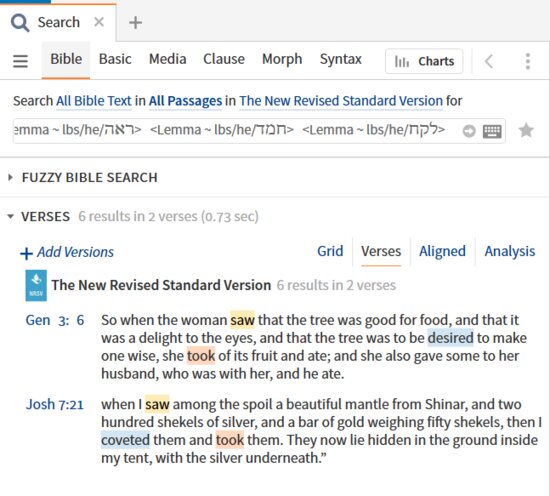
Find every occurrence of iva followed by subjunctive followed by infinitive.
Graham Criddle offered this morph search: lemma:ἵνα BEFORE @V??S BEFORE @V??N[2]
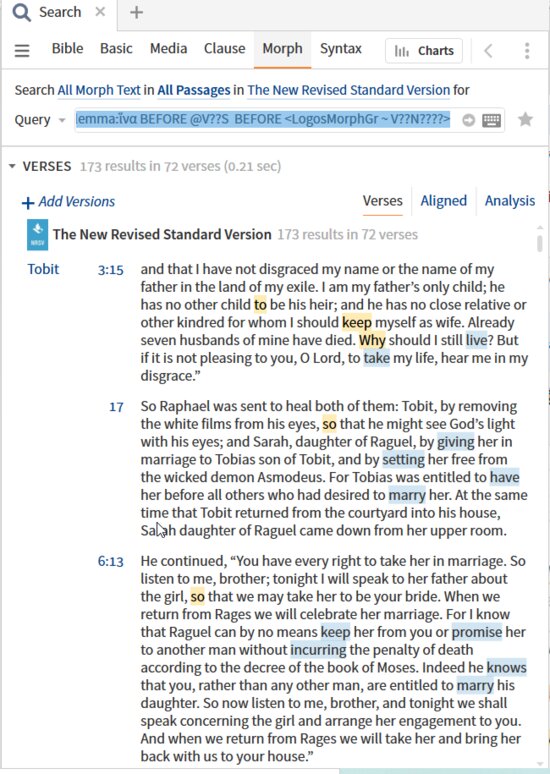
For reference as we have not addressed the syntax search, Mike Hogue offers which he builg off Luke 6:7 as an example:
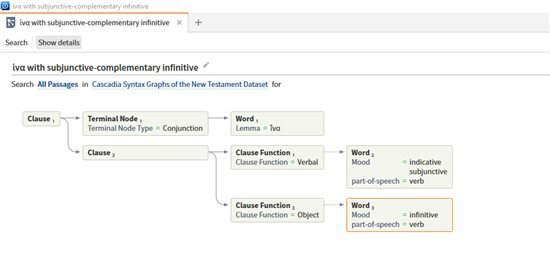
[1] Searching the Names of God Dataset - Faithlife Forums (logos.com) accessed 5/2/2021 8:22 PM
[2] Syntax Search - Faithlife Forums (logos.com) accessed 5/3/2021 10:33 PM